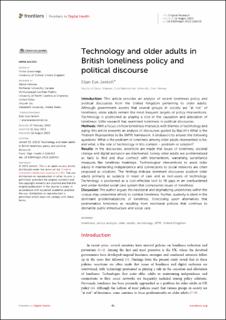| dc.contributor.author | Jentoft, Elian Eve | |
| dc.date.accessioned | 2023-08-18T07:11:58Z | |
| dc.date.available | 2023-08-18T07:11:58Z | |
| dc.date.created | 2023-08-16T15:28:03Z | |
| dc.date.issued | 2023 | |
| dc.identifier.uri | https://hdl.handle.net/11250/3084727 | |
| dc.description.abstract | Introduction: This article provides an analysis of recent loneliness policy and political discourses from the United Kingdom pertaining to older adults. Although government asserts that several groups in society are “at risk” of loneliness, older adults remain the most frequent targets of policy interventions. Technology is positioned as playing a role in the causation and alleviation of loneliness. Little research has examined loneliness in political discourses. Methods: With a focus on how loneliness intersects with themes of technology and aging, this article presents an analysis of discourses guided by Bacchi's What is the Problem Represented to Be (WPR) framework. It endeavors to answer the following questions: What is the problem of loneliness among older adults represented to be, and what is the role of technology in this context – problem or solution? Results: In the discourses, assertions are made that issues of loneliness, societal change and digital exclusion are intertwined. Lonely older adults are problematized as hard to find and thus connect with interventions, warranting surveillance measures like loneliness heatmaps. Technological interventions to assist older adults in maintaining independence and connections to social networks are often proposed as solutions. The findings indicate dominant discourses position older adults primarily as subjects in need of care and as non-users of technology. Technology is positioned as a cost-effective tool to fill gaps in an overburdened and under-funded social care system that compounds issues of loneliness. Discussion: The author argues the neoliberal and stigmatizing undertones within the corpus may undermine efforts to combat loneliness. Further, austerity is silent in the dominant problematizations of loneliness, foreclosing upon alternatives that problematize loneliness as resulting from neoliberal policies that continue to dismantle public infrastructure and social care. | en_US |
| dc.description.abstract | Technology and older adults in British loneliness policy and political discourse | en_US |
| dc.language.iso | eng | en_US |
| dc.rights | Navngivelse 4.0 Internasjonal | * |
| dc.rights.uri | http://creativecommons.org/licenses/by/4.0/deed.no | * |
| dc.title | Technology and older adults in British loneliness policy and political discourse | en_US |
| dc.type | Peer reviewed | en_US |
| dc.type | Journal article | en_US |
| dc.description.version | publishedVersion | en_US |
| cristin.ispublished | true | |
| cristin.fulltext | original | |
| cristin.qualitycode | 1 | |
| dc.identifier.doi | 10.3389/fdgth.2023.1168413 | |
| dc.identifier.cristin | 2167456 | |
| dc.source.journal | Frontiers in Digital Health | en_US |

